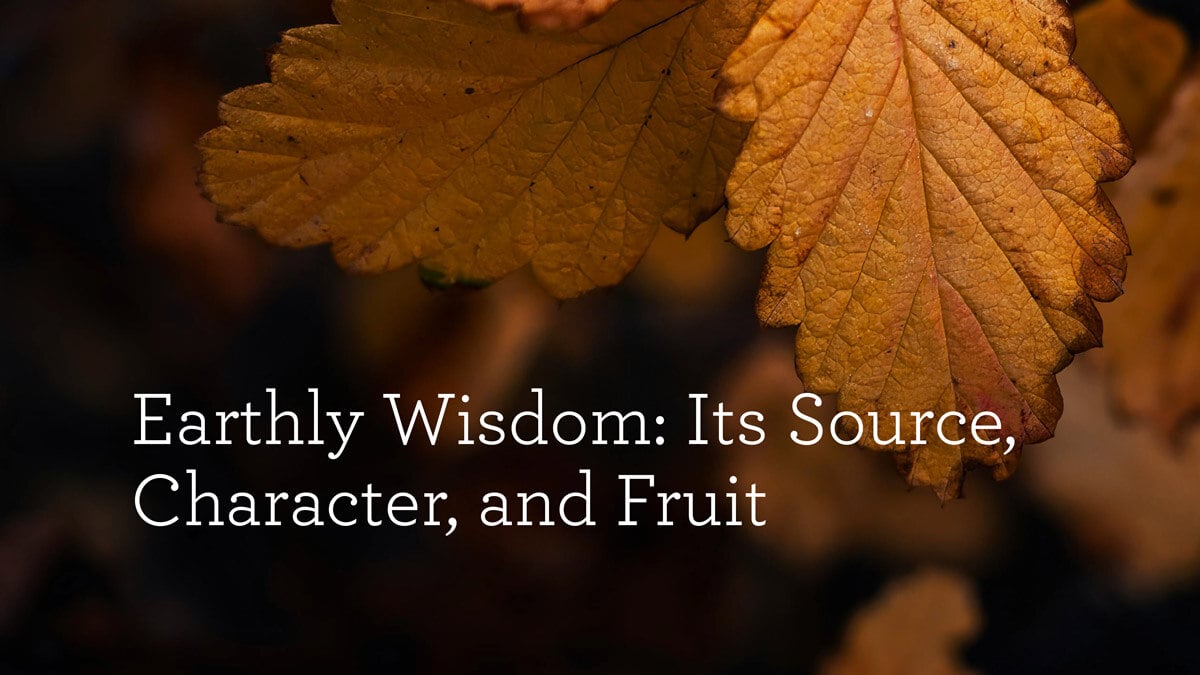The Bible teaches that the fear of the Lord is the basis for true wisdom (Ps. 111:10; Prov. 1:7; 9:10). Fearing God is the pathway into wisdom, the gate through which we walk to become wise. The nineteenth-century pastor Charles Bridges defines the fear of the Lord in these terms: “It is that affectionate reverence, by which the child of God bends himself humble and carefully to his Father’s law” in “every exercise of the mind” and “every object of life.” In other words, there is no knowledge apart from godliness. If we want God’s wisdom, we must live God’s way. No doubt, this approach is counterintuitive to today’s thinking. Modern wisdom says, “Just look within yourself, and you’ll find what you need.” But the Christian, with a worldview founded on biblical wisdom, says, “Until you come to know God, you will never know who you are or what you are to do.” The wisdom God prescribes in His Word—what James calls “the wisdom from above” (3:17)—is in direct opposition to that so-called wisdom we muster up ourselves. And in fact, one of the ways we recognize heavenly wisdom is by examining its counterpart, or that which comes from earth. James 3:13–18, a passage that addresses the differences between worldly wisdom and godly wisdom, is a study in contrast. Before defining true wisdom, James expounds false wisdom. In particular, verses 14–16 describe three facets of earthly wisdom: its source, its character, and its fruit. Concerning earthly wisdom’s source, James paints a picture for us using three adjectives: such wisdom is “earthly, unspiritual, demonic” (3:15). It is the antithesis of what comes from heaven. First: “earthly.” Where heavenly wisdom begins from heaven, earthly wisdom begins from—well, earth. It bound is by its setting, its success measured by achievement in the here and now. Earthly wisdom is from the dust and will eventually return to dust (Gen. 3:19). If we use earthly wisdom to think about heavenly wisdom, our view of the latter will always be skewed. We depend entirely upon God to pull back the curtain, so to speak, and reveal Himself to us. We can’t understand heavenly things using earthly means (1 Cor. 2:14). Next, earthly wisdom is “unspiritual,” inasmuch as it exists on a material plane, devoid of God’s Spirit. Instead of addressing issues of the soul, it encourages preoccupation with the body and its pleasures. In a sense, then, earthly wisdom’s apparent unspirituality is an anti-God spirituality, bringing us to the final adjective. James finally describes earthly wisdom as “demonic,” rooted in the spiritual forces of evil. It’s a familiar theme in the letter. Earlier in chapter 3, James blamed unrighteous speech on the “tongue” that is “set on fire by hell” (v. 6), and in chapter 4, he will address the issue of resisting the devil’s schemes (vv. 7–10). The only safeguard against this false wisdom, which stems from Satan himself, is by taking “the sword of the Spirit, which is the word of God” (Eph. 6:17). We ought not to be surprised. Jude warns of those who in every generation fight against the faith. They are “worldly people, devoid of the Spirit” (v. 19). These are those who are earthly, unspiritual, and empowered by the work of the Evil One. This earthly wisdom, with its source in the demonic, also bears the seals of “jealousy and selfish ambition” (James 3:16). When we put earthly wisdom at the forefront of things, we can expect to encounter covetousness and pride. “Jealousy” and “envy,” as the NIV has it, are two closely related terms. Jealousy is the intolerance of rivalry. There is a godly jealousy: God is jealous for His children, wanting to protect them from evil influence, like how parents want to protect their children. But in its sinful expressions, jealousy fears the prospect of someone becoming equal to us or, worse still, superior to us. Envy, the close cousin of jealousy, is resentment for the advantages others enjoy. Describing the sinister nature of envy, Jerry Bridges observes that “we tend to envy those with whom we most closely identify.” For example, the person who doesn’t care whether he has a lush lawn won’t envy his neighbor who does—but if that person does want a nice lawn, he’ll likely envy his neighbor who has a better one. Selfish ambition, James tells us, is the accompaniment to jealousy. We might define it as the inclination to use unworthy and divisive means to exalt self. Aristotle once spoke of the selfish ambition that marked the civil leaders of his day, which Douglass Moo summarizes as “the narrow partisan zeal of factional, greedy politicians.” Having set out on their political journeys with the desire to be public servants, they eventually turned inward, giving into the greater desire to exalt themselves. In a word, they gave into the same kind of selfish ambition against which James warns. The threat looms just as prominently against the people in the pews as it does for politicians. This drift toward jealousy and selfish ambition is dangerous. Not only is it contrary to the wisdom that comes from God, but it’s also the very antithesis of the Lord Jesus’ servanthood. If earthly wisdom’s source is in the devil and its characteristics are envy and pride, then we shouldn’t be surprised to learn that its results are “disorder and every vile practice” (James 3:16). In using the term “disorder,” James has in mind a form of anarchy—confused thinking, disruptive decision making, unsettledness, etc. Whenever we see these things in a family, in a business, or in a church, we can trace them back to their source: completely counter to the nature of God, earthly, not heavenly. Left unchecked, earthly wisdom will produce evil. When the umbilical cord between God and His revelation and His people has been cut, ungodliness is inevitable. Like a cancer left untreated and instead tolerated, it spreads and infects the whole body. “Sin,” James writes in chapter 1, “when it is fully grown brings forth death” (v. 15). James is able to write as he does neither because of some profound intellect in himself nor on account of some unique insight into the nature of relational dynamics. His instruction on true wisdom comes from the relationship he enjoyed with the Lord Jesus—the one who, as Paul writes, “became to us wisdom from God” (1 Cor. 1:30). If we want to grasp wisdom, we must know God in Christ. On one occasion, Jesus called His divided disciples together and taught them about the counterintuitive nature of wisdom that begins with God, saying, You know that those who are considered rulers of the Gentiles lord it over them, and their great ones exercise authority over them. But it shall not be so among you. But whoever would be great among you must be your servant, and whoever would be first among you must be slave of all. For even the Son of Man came not to be served but to serve, and to give his life as a ransom for many. (Mark 10:42–45) The Bible comes both to warn and to encourage, always turning us to Christ. He is true wisdom from above—the very embodiment of that pure and peaceable wisdom James commends (3:17). This article was adapted from the sermon “Such ‘Wisdom’” by Alistair Begg.
Fearing God is the pathway into wisdom.
Earthly Wisdom’s Source
Earthly Wisdom’s Characteristics
Earthly wisdom is from the dust and will eventually return to dust.
Earthly Wisdom’s Fruit
Jealousy and selfish ambition are the antithesis of Jesus, who took the form of a servant.
“Jesus, Who Became to Us Wisdom from God”

Copyright © 2024 , Truth For Life. All rights reserved.
Unless otherwise indicated, all Scripture quotations are taken from The ESV® Bible (The Holy Bible, English Standard Version®), copyright © 2001 by Crossway, a publishing ministry of Good News Publishers. Used by permission. All rights reserved.










 English (US) ·
English (US) ·